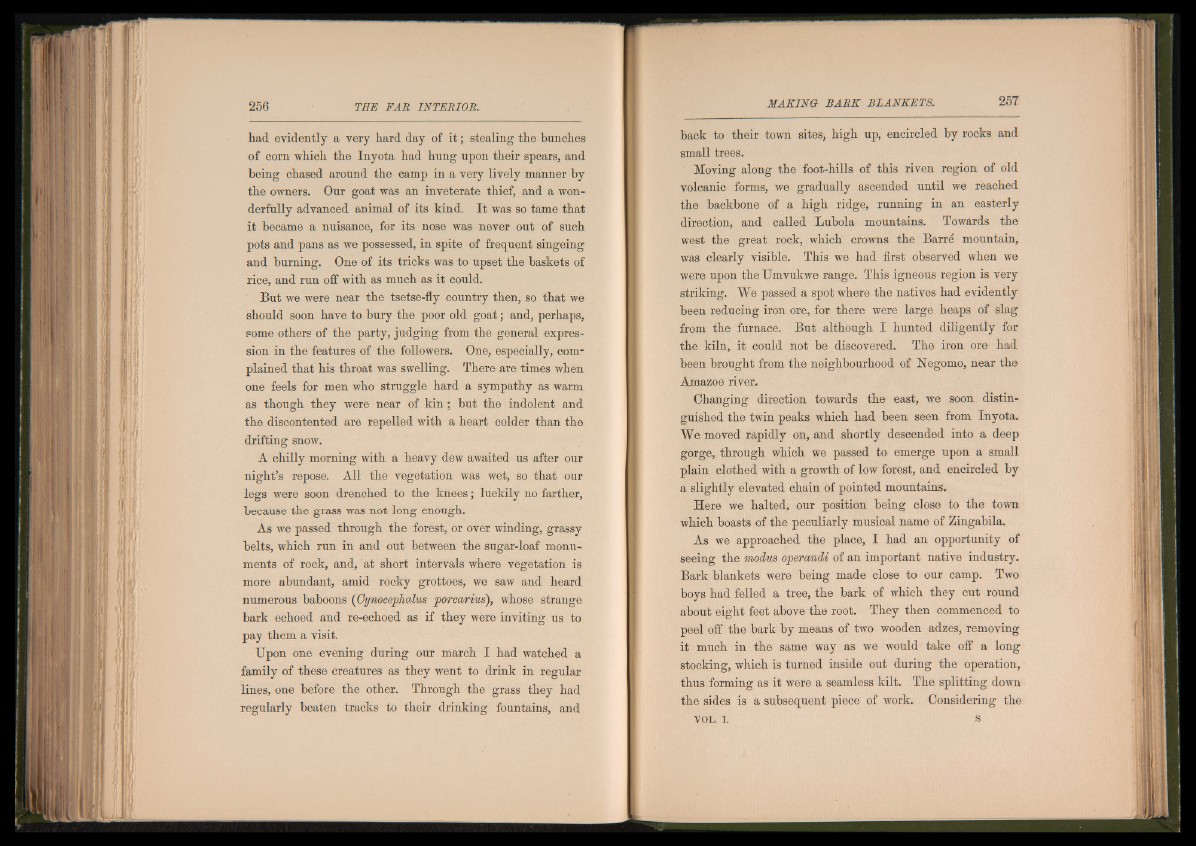
had evidently a very hard day of i t ; stealing the hunches
of corn which the Inyota had hung upon their spears, and
being chased around the camp in a very lively manner by
the owners. Our goat was an inveterate thief, and a wonderfully
advanced animal of its kind. I t was so tame that
it became a nuisance, for its nose was never out of such
pots and pans as we possessed, in spite of frequent singeing
and burning. One of its tricks was to upset the baskets of
rice, and run off with as much as it could.
But we were near the tsetse-fly country then, so that we
should soon have to bury the poor old goat; and, perhaps,
some others of the party, judging from the general expression
in the features of the followers. One, especially, complained
that his throat was swelling. There are times when
one feels for men who struggle hard a sympathy as warm
as though they were near of k in ; but the indolent and
the discontented are repelled with a heart colder than the
drifting snow.
A chilly morning with a heavy dew awaited us after our
night’s repose. All the vegetation was wet, so that our
legs were soon drenched to the knees; luckily no farther,
because the grass was not long enough.
As we passed through the forest, or over winding, grassy
belts, which run in and out between the sugar-loaf monuments
of rock, and, at short intervals where vegetation is
more abundant, amid rocky grottoes, we saw and heard
numerous baboons (Cynocephalus porcarius), whose strange
bark echoed and re-echoed as if they were inviting us to
pay them a visit.
Upon one evening during our march I had watched a
family of these creatures as they went to drink in regular
lines, one before the other. Through the grass they had
regularly beaten tracks to their drinking fountains, and
back to their town sites, high up, encircled by rocks and
small trees.
Moving along the foot-hills of this riven region of old
volcanic forms, we gradually ascended until we reached
the backbone of a high ridge, running in an easterly
direction, and called Lubola mountains. Towards the
west the great rock, which crowns the Barré mountain,
was clearly visible. This we had first observed when we
were upon theUmvukwe range. This igneous region is very
striking. We passed a spot where the natives had evidently
been reducing iron ore, for there were large heaps of slag
from the furnace. But although I hunted diligently for
the kiln, it could not be discovered. The iron ore had
been brought from the neighbourhood of Negomo, near the
Amazoe river.
Changing direction towards the east, we soon distinguished
the twin peaks which had been seen from Inyota.
We moved rapidly on, and shortly descended into a deep
gorge, through which we passed to emerge upon a small
plain clothed with a growth of low forest, and encircled by
a slightly elevated chain of pointed mountains.
Here we halted, our position being close to the town
which boasts of the peculiarly musical name of Zingabila.
As we approached the place, I had an opportunity of
seeing the modus operandi of an important native industry.
Bark blankets were being made close to our camp. Two
boys had felled a tree, the bark of which they cut round
about eight feet above the root. They then commenced to
peel off the bark by means of two wooden adzes, removing
it much in the same way as we would take off a long
stocking, which is turned inside out during the operation,
thus forming as it were a seamless kilt. The splitting down
the sides is a subsequent piece of work. Considering the
VOL. i s